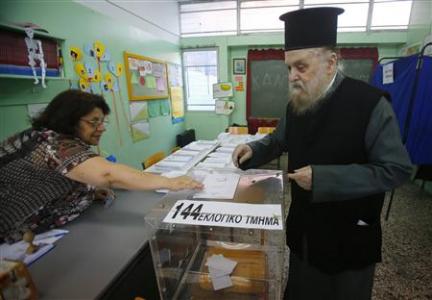(Reuters) – Greeks voted on Sunday in an election that could decide whether their heavily indebted country stays in the euro zone or heads for the exit, potentially unleashing shocks that could break up the single currency.

In an election fought over a punishing austerity package demanded by international lenders as the price of keeping Greece afloat, opinion polls showed the radical leftist SYRIZA party, which wants to scrap the deal, running neck and neck with the conservative New Democracy, which broadly backs it.
The European Union and International Monetary Fund have said the conditions of the 130-billion-euro ($164-billion) bailout accord agreed in March must be accepted fully by a new government or funds will be cut off, driving Greece into bankruptcy.
All the main parties say they will keep Greece in the single currency, but SYRIZA leader Alexis Tsipras believes a new deal can be renegotiated, betting that European leaders cannot afford the financial market turmoil that would be unleashed by cutting a member of the euro zone loose.
“We beat fear. Today we are opening the road to hope, the road to a better tomorrow with our people united, dignified and proud, in a Greece that is an equal member of a Europe that’s changing,” said Tsipras, 37, who has shot from obscurity to global celebrity in a matter of weeks.
“We are optimistic. The future belongs to the bearers of hope. We will win,” he told a jostling media scrum.
On the right, establishment heir and New Democracy leader Antonis Samaras says rejection of the EU/IMF bailout would mean a return to the drachma and even greater calamity, although he, too, wants to ease some aspects of the package.
Samaras, smiling but accompanied by nothing like the media attention enjoyed by Tsipras, told reporters in the Peloponnesian town of Pylos where he cast his ballot: “Tomorrow will bring a new beginning for Greece.”
Opinion polls show Greeks, weary and disillusioned after five years of deep recession, overwhelmingly favor remaining in the euro, but there is bitter anger over repeated rounds of tax hikes, slashed spending and sharp cuts in wages and pensions.
Many voters are also furious with New Democracy and the other traditional ruling party, PASOK, blaming them for decades of corruption and waste which have left them with a ruined economy and one of the heaviest debt burdens in the world.
A win for Greece’s national soccer team on Saturday at the Euro 2012 championships provided some lift for voters but there was little sign of enthusiasm at the polling booths.
“It’s the first time I feel depressed after voting, knowing that I voted again for those who created the problem, but we don’t have another choice,” said 66-year-old English teacher Koula Louizopoulou after casting her ballot in Athens.
“I voted for the bailout because these are the terms that will keep us in Europe,” she said.
UNCERTAINTY
A previous election on May 6 created weeks of uncertainty when no party was able to form a government and markets will now watch anxiously for the first signs of a result, with exit polls due shortly after voting ends at 7 p.m. (1600 GMT).
The party gaining the most votes gets an automatic 50-seat advantage but neither New Democracy or SYRIZA is expected to have an outright majority and whichever emerges as the top party will have to hold coalition negotiations with smaller groups.
The Socialist PASOK party, virtually wiped out in the inconclusive May election, would join its old rivals New Democracy in a pro-bailout unity government, an option SYRIZA has repeatedly ruled out.
Some European leaders have urged Greeks to reject SYRIZA or risk undermining the very foundations of the single currency.
Five opinion polls published before a blackout two weeks ago put New Democracy narrowly ahead. Two other polls had SYRIZA leading.
But whoever wins power may find it is short-lived and, despite the insistence of EU politicians, some adjustment of the bailout terms may be inevitable if Greece is to get on top of a public debt amounting to 165 percent of gross domestic product.
“It is a scenario I see as likely and if that is the condition presented for Greece to stay and then move on, I would say it is probably something that should be attempted,” Angel Gurria, head of the Organization for Economic Cooperation and Development, told Reuters in an interview.
Central banks from Tokyo to London are readying arsenals to defend banks and national currencies against any post-election turmoil. The result will dominate a meeting of the Group of 20 world economic powers on Monday and Tuesday in Mexico.
Finance officials in the euro zone have discussed limiting the size of withdrawals from ATM machines, imposing border checks and introducing euro zone capital controls as a worst-case scenario.
Euro zone officials have hinted they might give a new Greek government some leeway on how it reaches debt targets set by the EU/IMF bailout package, but there would be no change to the targets themselves.
Euro zone paymaster Germany warned Greeks on Saturday the bailout would not be renegotiated.
“That’s why it’s so important that the Greek elections preferably lead to a result in which those that will form a future government say: ‘Yes, we will stick to the agreements’,” Chancellor Angela Merkel told a party conference.
A Greek exit from the single currency would heap further pressure on two far larger European economies – Spain has already received up to 100 billion euros to save its struggling banks and Italy has also slipped closer to crisis.
TEST
Even if New Democracy emerges victorious, it is likely to face a strong protest movement led by the newly empowered SYRIZA, and any new government will take the reins of a country on the verge of bankruptcy.
Five years of recession and more than two years of acute crisis have started to fray the edges of Greek society, undergoing its severest test since the overthrow of the military dictatorship in 1974.
The streets of central Athens are scarred by repeated waves of protests, some hospitals are short of vital medicines and reports of suicides caused by the crisis have become routine.
The far-right Golden Dawn party also won seats in the first election, underscoring the fragmentation of a stressed society wrestling with unemployment of almost 23 percent and plummeting living standards.
Some global businesses and banks are in retreat.
Europe’s biggest retailer Carrefour said on Friday it was selling up in Greece, a day after French bank Credit Agricole moved to take direct control of its Albanian, Bulgarian and Romanian units from its Greek bank Emporiki.
($1 = 0.7939 euros)
(Writing by Matt Robinson and James Mackenzie; editing by Elizabeth Piper)





